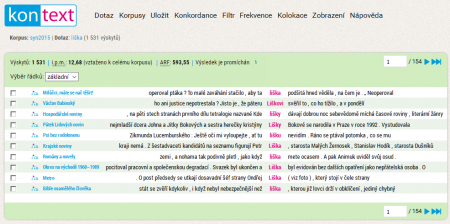Table of Contents
Concordance
A concordance represents all events (occurrences) of the searched phenomenon in the corpus along with the surrounding context. In practice, within the concordance we single out the KWIC (i.e. key word in context), which is the searched word/phenomenon and its right and left context. One line of the concordance list is called a concordance line.
Concordance list
A concordance list which records all occurrences of the wanted phenomenon in the corpus, is the most common result of a corpus query. A survey of the concordance list is usually the first step in a corpus analysis, because it provides information about the common and also less common contexts of the wanted phenomenon. Owing to the enormous size of current corpora, the majority of scholars today works with a random sample of the concordance list.
Random sample from a concordance list of the lemma slovník from the corpus SYN2010:
| samé prozaické : knihy , | slovníky | , aktovka a tak podobně . |
| stech verších a třeba šestipenci za | slovník | , do kterého se díváte nepravidelně |
| je nevedl kouč Souček , jehož | slovník | se nelíbil soudci , který ještě |
| měla stát klíčovým slovem mého budoucího | slovníku | . Mou první větší životní investicí |
| šíři mnohotvárnost života . “ Erotický | slovník | ” tohoto preláta je neobyčejně bohatý |
| například ' Sheerwater Seedling ' . | Slovník | okrasných dřevin Hustě rozmístěné větve |
| poznávacích postupů , vhodný chemický | slovník | , atd . Dále jsou zde |
| “ že oni vykrádají i náš | slovník | , stejně jiný neexistuje . Všechny |
| seznámení se životem církve a jejím | slovníkem | , ale naše kázání poslouchali |
| vyjadřoval se snadněji a v jeho | slovníku | se objevilo mnoho nových slov . |
| jedna gramatická karta . 3 ) | Slovník | s pořadačem Na stáncích a servisních |
Theoretical connections
AA concordance in its typical form (analyzed horizontally by line) presents a syntagmatic and parole aspect (the wanted word and its context, i.e. the i - i relationship). A concordance list read vertically (“by column”) then mediates a paradigmatic a langue viewpoint (words in one position represent mutual substitutes, i.e. the either - or relationship).








